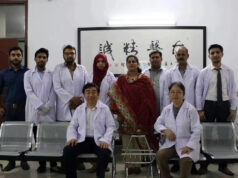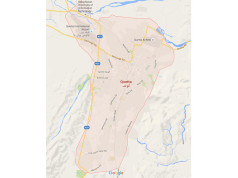Dervaish Ali
The Canadian writer Henry Giroux reports that, ”plastic surgeons in the United States have seen a surge in demand for procedures ranging from eye-lid lifts to rhinoplasty, popularly known as nose job, from patients seeking to improve their image in selfies and on social media”.
Moreover, he says, “A search on photo sharing app Instagram retrieves over 23 million photos uploaded with the hashtag #selfie, and a whopping 51 million with the hashtag #me. Rihanna, Justin Bieber, Lady Gaga and Madonna are all serial uploaders of selfies. Model Kelly Brook took so many she ended up ‘banning’ herself!.”
In a previous blog On Noise and Solitude, I ended my piece with a twist on Descartes’ Cogito. I start this one with another pun on that famous uttering (Cogito ergo sum—I think, therefore I am) of the father of modern rationalism, but this time with the voice of the late Polish sociologist Zygmunt Bauman who once described this aspect of the social media phenomenon like this: “I am seen, therefore I exist!”—or, the more people see me, “like” me and “like” what I post, share and forward, the more I am. Image is now everything. Visibility, a la image, is existence and graphic promiscuity is the highest and purest form of being. “It takes real practice to appear authentic!” as one prolific Facebook user opines.
A friend has asked me to say something about the digital plague of narcissism and celebrity obsessed exhibitionism that is engulfing whole societies like a deadly squid. Most people when asked say that they join social media to “keep in touch with family and friends”. That makes sense but many naively think of platforms like Facebook, or Twitter, as one big phone directory—or that only. Studies have shown that within days and weeks of signing up, for most people the boundaries of that raison d’etre extend to include all sorts of other justifications for a plethora of obnoxious online activities. There are reasons for these and also consequences.
A feature of modern living is the complaint of boredom and depression. Young people are especially prone to these malaises. Traditional cultures—societies where secular modernity has not made deep inroads yet—-lack words for these modern pathologies of the soul. There is no Urdu word for boredom, for example. The very ideas and concepts are alien to these societies. A word or an idea is often preceded by a condition: no condition, no word for it. As the psychologist John F. Schumaker has shown in his meticulous studies, most of the cases of depression are actually cases of demoralization which he defines as “a type of existential disorder associated with the breakdown of a person’s cognitive map”. Schumaker identifies this condition as, “…an overarching psycho-spiritual crisis in which victims feel generally disoriented and unable to locate meaning, purpose or sources of need fulfillment. The world loses its credibility, and former beliefs and convictions dissolve into doubt, uncertainty and loss of direction. Frustration, anger and bitterness are usual accompaniments, as well as an underlying sense of being part of a lost cause or losing battle.” What drives these, he tells us, are, “individualism, materialism, hyper-competition, greed, over-complication, overwork, hurriedness and debt” and whose symptoms are “passivity, short attention spans, over-indulgence and a masturbatory approach to life.” This is the life that sages of old like Socrates and Plato in the Greek tradition and mystics and failasufs in the Islamic world have called the “unexamined life”. In its simplest explanation, this is a lifestyle where man lives a life devoid of any serious reflection, shunning thought and the pursuit of knowledge and wisdom. It is a form of living that confuses what is essential with what is accidental in life. In those who opt for it, there is a lack of awareness of our true origin and end, of where have we come from and where we are headed. In essence, for Socrates, it was the reality of death that made him utter his famous words and for many Muslim sages, the question of forgetfulness and the truth of afterlife, of aakhirat (ma’ad).
Living an unexamined life results in the loss of a sense of being and belonging. With the encroachment of unrestrained individualism and hedonism, a true sense of community disappears; trust, friendship and intimacy plummet. And, contrary to the belief of digital utopians, those who slavishly worship the god of modern technology, real communities cannot be formed in virtual Internet spaces. Real communities mean having a sense of place, having roots. It means a willingness to share the responsibilities of communal living. There are not only privileges but also burdens; there are rights, but also duties, duty to oneself and to the neighbor. There are consequences, real consequences, of what we say and do to others in real communities. Just like we cannot “unfriend” someone real with the click of a mouse, real communities cannot be erased either by ticking against a “delete and unjoin” option on some drop menu on a digital screen!
In the increasingly angst infested, self-obsessed cultural deserts, young people in particular grow up confused and lost, without any guiding principles or an integrated philosophy of life. Once traditional or religious sources of meaning are destroyed and the inner and outer wells of morality and wisdom are polluted or dried up by the invasive norms of modern consumer culture and its anti-social tricknologies (perversely called “social”) that constantly titillate our lowest desires, people are demoralized and become victims of boredom and depression. Boredom is often a natural outcome of shallow and effortless lifestyle that is on display in the form of digital self-representations on much of the social media: “since nothing lives up to the hype, the world of consumer is actually an ongoing exercise in disappointment”, Schumaker tells us. The resulting sense of futility and powerlessness overwhelm which further leads to self-destructive mindsets and behavior: drug abuse and suicidal tendencies, for example. In the absence of rewarding, interesting or meaningful experiences, these fragile, meaning-starved and unmoored selves snap very easily.
The demoralized “trance generation” of online and offline cultures that feed on celebrity-fed inanities are for the most part “products of invisible parents, commercialized education, cradle-to-grave marketing” a morally, intellectually bankrupt generation celebrating its consumer consciousness “with an insatiable appetite for any technology that can downsize awareness and blunt the emotions” continues Schumaker.
Boredom is essentially meaninglessness of the worst type, a feeling of void within. Traditional cultures have always had ways to counter such inner maladies, for example, through the inculcation of the virtues of qana’at and ridha, or contentment and simplicity, in the individual. Modern consumer culture and its ethos of accumulation, dynamism and perpetual action—“just do it!”—on the other hand, sells us unrestricted hedonism and denigrate the contended soul as “less developed”, “static”, “backward” and “lazy”. The traditional Japanese contrast this mode of restless, fragmented existence with their own when they tell us, “Don’t just do something. Sit there!”
Materialist consumption may give us satisfaction up to a certain limit beyond which things lose their fulfilling potential. The reason for this lies in our very nature, our fitrah, the way we are constituted as human beings, as insan. We all seek meaning but the sources of meaning are not only in the material. To seek satisfaction and meaning in the material only is a sign of an unhealthy self, and which will always lead to psychic numbing and spiritual malaise. All this attachment, all this wanton consumerism, this khudbeeni and khud numayee—narcissism—this endless craving and desire for the profane and the trivial eventually lead to suffering of the worst kind, what the Buddhists call dukkha. For Muslims, whose religion has also been called “the religion of married monks” by others, it is a requirement to engage with this world (al-duniya), but we are also constantly cautioned to keep a safe distance from it and not to indulge in it heedlessly: “Be in the world but not of the world”, as the Sufis say. We are to be vigilant, to constantly reflect and examine our thoughts and acts. We must listen to Socrates when he tells us that “an unexamined life is not worth living.’
Note: Saal e nau mubarak to all the readers of this blog. Happy New Year!
Disclaimer: Views expressed in this article are those of the author and Balochistan Voices not necessarily agrees with them.
Share your comments!









